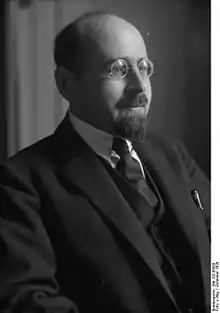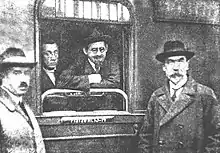Nikolay Krestinsky
Nikolay Nikolayevich Krestinsky (Russian: Никола́й Никола́евич Крести́нский; 13 October 1883 – 15 March 1938) was a Russian Bolshevik revolutionary and Soviet politician who served as the Responsible Secretary of the Russian Communist Party (b).
Nikolay Krestinsky | |
|---|---|
 | |
| Responsible Secretary of the Russian Communist Party | |
| In office December 1919 – March 1921 | |
| Preceded by | Elena Stasova (as Chairman of the Secretariat) |
| Succeeded by | Vyacheslav Molotov |
| People's Commissar for Finance of the Russian SFSR | |
| In office 16 August 1918 – 22 November 1922 | |
| Premier | Vladimir Lenin |
| Preceded by | Isidore Gukovsky |
| Succeeded by | Grigory Sokolnikov |
| Full member of the 8th, 9th Politburo | |
| In office 8 March 1919 – 16 March 1921 | |
| Full member of the 8th, 9th Secretariat | |
| In office 8 March 1919 – 16 March 1921 | |
| Personal details | |
| Born | 13 October 1883 Mogilev, Russian Empire (present day Mahilyow Voblast, Belarus) |
| Died | 15 March 1938 (aged 54) Moscow, Union of Soviet Socialist Republics |
| Political party | RSDLP (Bolsheviks) (1903-1918) Russian Communist Party (1918-1937) |
| Alma mater | Saint Petersburg State University |
| Signature |  |
Origins
Krestinsky was born in the town of Mogilev,[1][2] in what is now Mogilev Region of Belarus. According to Russian archivist A. B. Roginsky, Krestinsky was of ethnic Russian origin.[1] Other sources suggest ethnic Ukrainian origins,[2] while according to Felix Chuev, Vyacheslav Molotov maintained that Krestinsky's family had converted from Judaism to Eastern Orthodoxy.[3]
Rise

Krestinsky joined the Russian Social Democratic Labor Party in 1903 and sided with its Bolshevik faction. After the February Revolution, which overthrew monarchy in Russia, he proved to be a capable organizer and was elected to the Central Committee of the Bolshevik party on 3 August 1917 (Old Style). He was made a member of the first Soviet Orgburo on 16 January 1919 and the first Politburo on 25 March 1919. He was also made a member of the Central Committee's Secretariat on 29 November 1919 and served as Responsible Secretary of the Central Committee for the next year and a half.
Fall from power
In late 1920 to early 1921, after the Bolshevik victory in the Russian Civil War, Krestinsky supported Leon Trotsky's faction in an increasingly bitter dispute over the direction of the country. After Vladimir Lenin's victory at the tenth party congress in March 1921, Krestinsky lost his Politburo, Orgburo and Secretariat posts and became Soviet ambassador to Germany. The post was an important and sensitive one because of Soviet Russia's crucial and delicate relationship with Germany at the time, but not nearly as important as his previous posts.
Krestinsky supported Trotsky and the Left Opposition in 1923–early 1927, but distanced himself from Trotsky later in 1927. He completely broke with the opposition in April 1928.[4]
Show trial
Krestinsky continued working as a diplomat until 1937, when he was arrested during the Great Purge. He was put on trial (as part of the Trial of the Twenty One) on 12 March 1938. While almost all other defendants admitted their guilt during the Moscow Show Trials, Krestinsky at first denied everything, but reversed himself the following day.
On 2 March he said to the presiding judge, Vasili Ulrikh:
I do not recognize that I am guilty. I am not a Trotskyite. I was never a member of the "right-winger and Trotskyite bloc", which I did not know to exist. Nor have I committed a single one of the crimes imputed to me, personally; and in particular I am not guilty of having maintained relations with the German Secret Service.
The following day, he made a total reversal of his position:
Yesterday, under the influence of a momentary keen feeling of false shame, evoked by the atmosphere of the dock and the painful impression created by the public reading of the indictment, which was aggravated by my poor health, I could not bring myself to tell the truth, I could not bring myself to say that I was guilty. And instead of saying, "Yes, I am guilty," I almost mechanically answered, "No, I am not guilty."
Such a reversion was a rare episode in the show trials of the late 1930s. Krestinsky was sentenced to death and executed on March 15, 1938. [5] He was partially exonerated during Nikita Khrushchev's De-Stalinization program. Krestinsky was cleared of all charges during Mikhail Gorbachev's perestroika reforms.[6]
References
- "Март". old.memo.ru. Retrieved Aug 25, 2020.
- Rumyantzev, Vyacheslav. "Крестинский Николай Николаевич " ("Krestinsky Nikolai Nikolaevich"). ХРОНОС – Всемирная История в Интернете (HRONOS World History on the Internet). 26 Feb. 2009.
- Chuev, Felix (ed), Molotov Remembers: Inside Kremlin Politics, 1993, Dee Ivan Inc
- "Gus Fagan: Christian Rakovsky (Part 5)". www.marxists.org. Retrieved Aug 25, 2020.
- Minaev, Dmitri. 1938: Seventeen former Bolshevik officials from the Trial of the 21. http://www.executedtoday.com/tag/nikolai-krestinsky/
- Robert Williams Davies, The Soviet History in the Gorbachev Revolution, (Indiana University Press, 1989), p. 146
External links
 Media related to Nikolai Krestinsky at Wikimedia Commons
Media related to Nikolai Krestinsky at Wikimedia Commons- Newspaper clippings about Nikolay Krestinsky in the 20th Century Press Archives of the ZBW
| Political offices | ||
|---|---|---|
| Preceded by Isidore Gukovsky |
People's Commissar for Finance of the RSFSR 16 August 1918 – October 1922 |
Succeeded by Grigory Sokolnikov |
